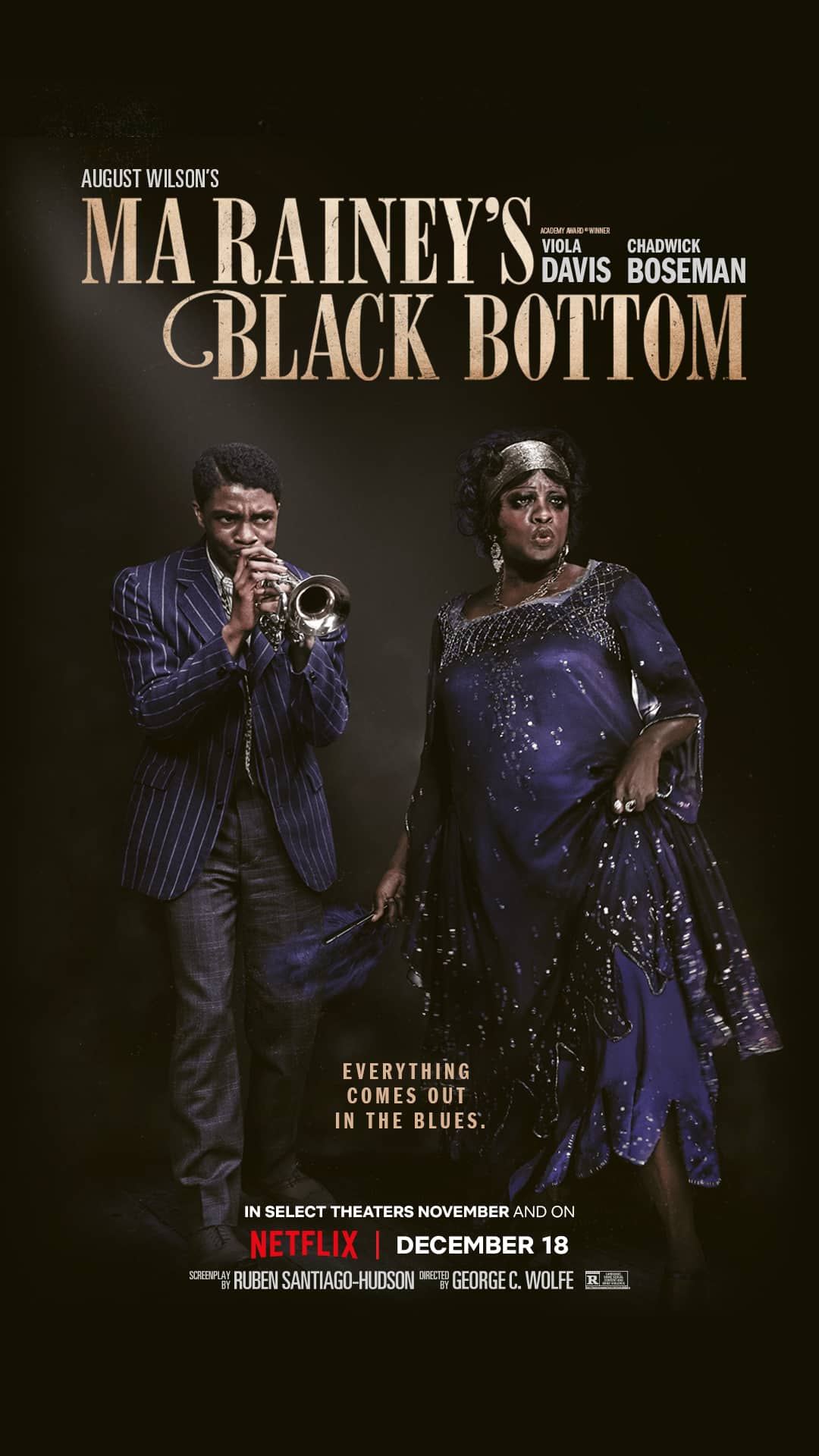
- Starring
- Viola Davis, Chadwick Boseman, Colman Domingo
- Writer
- Ruben Santiago-Hudson
- Director
- George C. Wolfe
- Rating
- 14A (Canada), R (United States)
- Running Time
- 94 minutes
- Release Date
- December 18th, 2020 (Netflix)
Overall Score
Rating Summary
Ma Rainey's Black Bottom is a stellar character and race study with great music, performances, and writing but whose pieces couldn't quite come together.
As far as most audiences are concerned, Ma Rainey’s Black Bottom, the latest film adaptation of an August Wilson following 2016’s Fences, marks the final on screen performance by Chadwick Boseman following his tragic death this past August. Nevertheless, this performance has earned plenty of buzz, perhaps given a boost in some circles due to his passing. That being said, Boseman’s performance is certainly worthy of awards in its own right regardless of his passing (more on that later). Viola Davis’ lead performance has also received similar buzz. Thankfully in a tumultuous year such as this one, there are streaming services that can give a film like this an audience. While it won’t be for everyone, a very digestible running time around the 90 minute mark along with some great music, some compelling social commentary, and a stellar cast including the two aforementioned performances make this well worth the watch over the holidays despite the fact that it doesn’t all come together in enough of a satisfying way.Being based on a play, Ma Rainey’s Black Bottom does feel like one at times but not in a distracting way. For those unfamiliar with the play, the film take place in late 1920s Chicago where a blues band is about to participate in a recording session like no other once the larger-than-life Mother of Blues, Ma Rainey (Davis) showed up. While the musicians in the band, Cutler (Colman Domingo), Slow Drag (Michael Potts), Toledo (Glynn Turman), and the ambitious Levee (Boseman), were relegated to the rehearsal room, the notorious diva was certainly not afraid to ensure that all of her demands were met by her white manager and producer as they battled for control over her music. Within the rehearsal room, the band engaged in a series of intense ideologically diverse conversations shaped by their life experiences spanning multiple generations, spurred by the hotheaded Levee whose focus was clearly on his future beyond the demanding Ma Rainey and her band who did not understand his talents. Though it may not have seemed that way, it became immediately clear that Levee and the band were more alike than they realized which was a sobering realization by the others.The problem with Ma Rainey’s Black Bottom was that the dynamic among Levee and the band members was much more interesting than Ma Rainey herself who admittedly was a deeper character than the outrageous diva. Once the character finally came together in the recording studio, it was fun to watch but there wasn’t nearly enough of it which didn’t quite allow them to mesh together in enough of satisfying way, catchy music aside. Though just like in the rehearsal room, Levee remained a wildcard as he asserted his will upon the story for better or worse with Ma Rainey not too far behind. In the end, in spite of their intentions, they lived in a world where the odds were insurmountably stacked against them, their reality inevitably won out. However, this did not make it any less hard to watch for the viewers and the characters.Technically speaking, Ma Rainey’s Black Bottom was impressive. For a film about a blues band, the score was on point while the costumes were just as solid. Meanwhile. the gritty set design and the contrast between worlds helped further pull viewers in. However, the best part of the film ultimately was its performances which were aided by some excellent writing. As mentioned, Davis was an absolute firecracker as Ma Rainey. Though it’s a smaller role than some might expect (maybe not a lead but rather a co-lead at best with Boseman), this did not make her any less powerful to watch as she made her presence felt. The more impressive performance came from Boseman as Levee. He commanded the screen, bringing range, energy, and a touch of vulnerability as the ambitious and impulsive yet damaged trumpet player. His emotion was there for all to see and one can’t help but stop whatever they are doing and hang on to every word. The remainder of the cast including Domingo, Potts, and Thurman as Cutler, Slow Drag, and Toledo were solid as was their chemistry with Boseman. Those scenes in the rehearsal room were dynamite thanks to them and some great writing.At the end of the day, Ma Rainey’s Black Bottom is a powerful character and race study that should not be missed.still courtesy of Netflix
If you liked this, please read our other reviews here and don’t forget to follow us on Twitter or Instagram or like us on Facebook.

The EIC of the coincidentally-named keithlovesmovies.com. A Canadian who prefers to get out of the cold and into the warmth of a movie theatre.
Discover more from
Subscribe to get the latest posts sent to your email.
